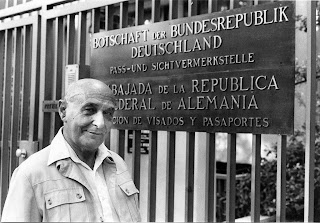 |
| Garbo or Alaric? |
Today is a great day for History fans like The Grandma who is totally excited with the news: the secret services of the British Government, the MI5, have aired new documents about the WWII and we can read some interesting new information about this important fact, especially for us, the documents about Joan Pujol Garcia, codename Garbo in the UK, codename Arabel in Germany, a spy for the Allies who had a key role in the success of Operation Fortitude, the deception operation intended to mislead the Germans about the timing and location of the invasion of Normandy near the end of the war.
Joan Pujol Garcia MBE (1912–1988) deliberately became a double agent during World War II, known by the British codename Garbo and the German codename Arabel. Pujol had the possibly unique distinction of receiving decorations from both sides during World War II, gaining both an Iron Cross from the Germans and a Member of the Order of the British Empire from the British.
 |
| Joan Pujol Garcia in the German Embassy |
Pujol and his wife contacted the British and American intelligence agencies, but each rejected his offer.
Undeterred, he created a false identity as a fanatically pro-Nazi Spanish government official and successfully became a German agent. He was instructed to travel to Britain and recruit additional agents; instead he moved to Lisbon and created bogus reports from a variety of public sources, including a tourist guide to England, train timetables, cinema newsreels, and magazine advertisements. Although the information would not have withstood close examination, Pujol soon established himself as a trustworthy agent. He began inventing fictional sub-agents who could be blamed for false information and mistakes.
The Allies finally accepted Pujol when the Germans spent considerable resources attempting to hunt down a fictional convoy. After the initial interviews carried out by Desmond Bristow of Section V MI6 Iberian Section, Juan Pujol was taken on. The family was moved to Britain and Pujol was given the code name Garbo.
 |
| The Garbo Network |
The false information Pujol supplied helped persuade German intelligence that the main attack would be in the Pas de Calais, keeping two armoured divisions and 19 infantry divisions there for two months after the Normandy invasion.
Garbo's life was reproduced in cinema with a film that explains his interesting and fascinating life.
More information: National Archives-United Kingdom Government
Spying is a like a game of chess: Sometimes you have to withdraw,
sometimes you have to sacrifice one of your pieces to win,
preferably a knight rather than a king or queen.
John Rhys-Davies
No comments:
Post a Comment